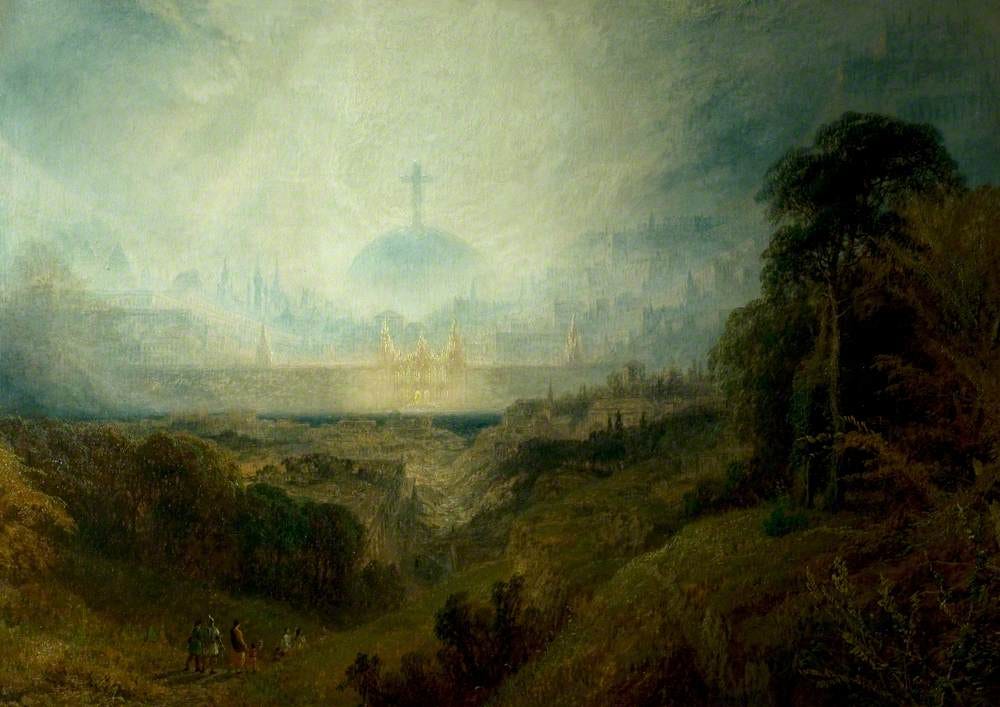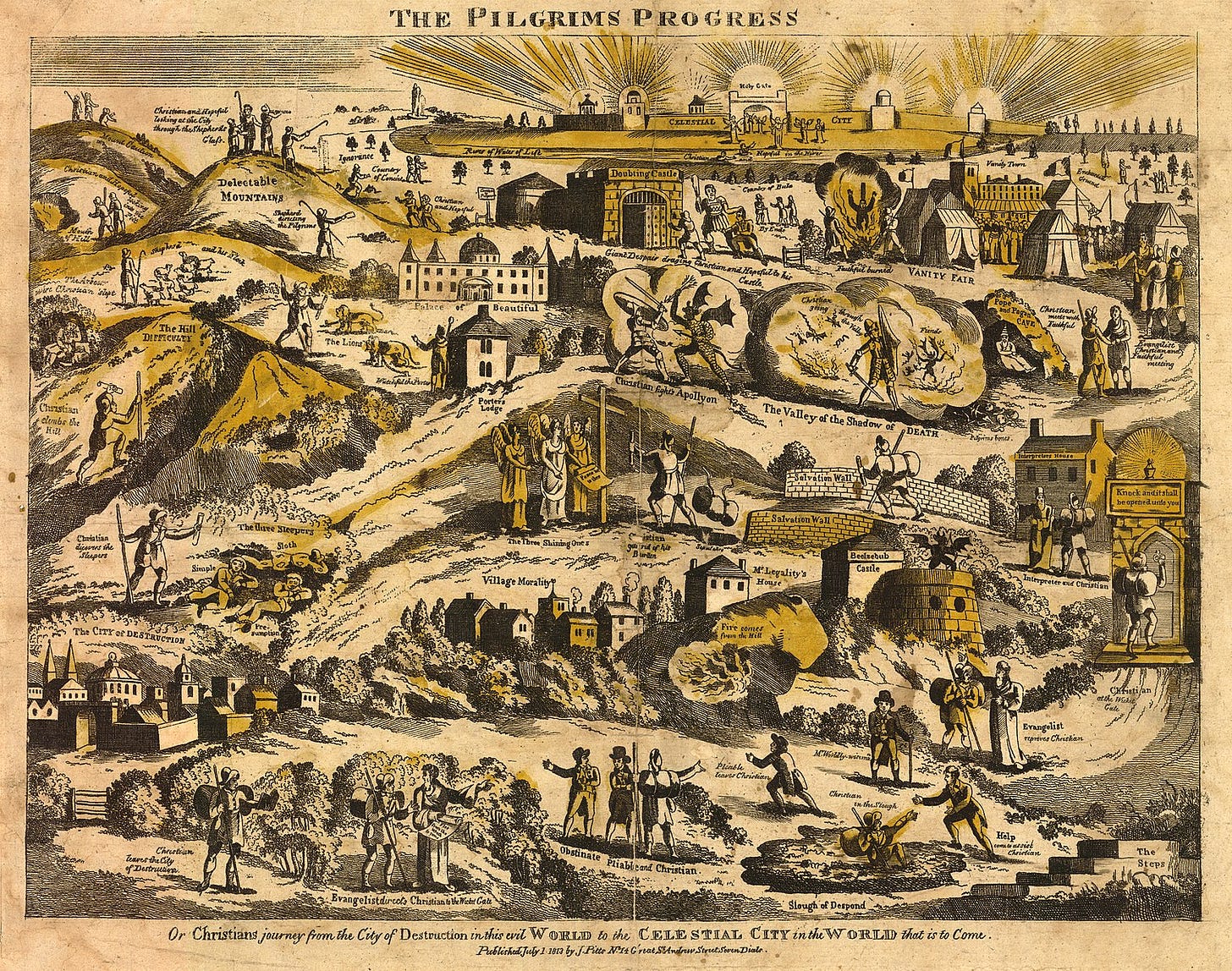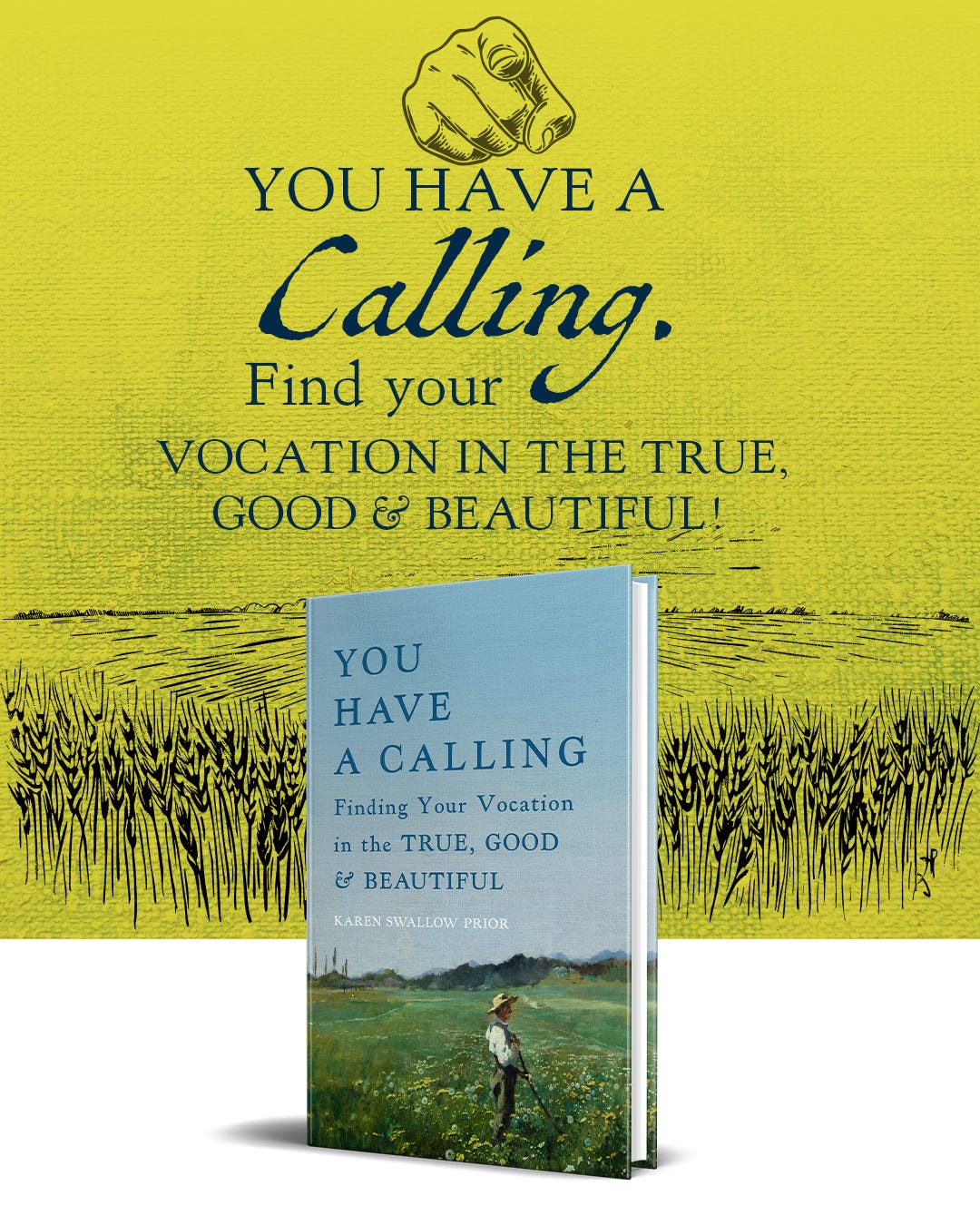The Pilgrim's Progress: Week 6
"They were transfigured, and they had raiment put on that shone like gold."

In this last section of Part 1 of The Pilgrim’s Progress, Bunyan waxes more sermonic than ever. Having enticed us this far on an adventurous journey laden with dangers, toils, and snares, along with a parade of characters both lively and terrifying, he sets the reader down for a long spell of Christian hashing out with Hopeful the nature and means of salvation, the insufficiency of any person to be saved under the law, Hopeful’s retelling of Faithful’s leading him through a prayer of salvation (aka “the sinner’s prayer”), Hopeful’s continuing anxiety, and a discourse on various causes and manners of backsliding.
The doctrinal discussion is deep here, the narrative nearly non-existent. Although the comparison would likely make Bunyan turn over in his grave, it is as though we are at a nineteenth-century tent revival led by Charles Finney during the Second Great Awakening. Finney would invite those considering salvation up front to the “anxious bench” where they would undergo intense prayer, exhortation, and examination before reaching an emotional pitch that would catapult them over the spiritual brink into acceptance of salvation.
Bunyan, through Hopeful, seems to find the source of spiritual anxiety from inner, religious scrupulosity, while Finney’s tactics (the controversial “new methods” as they were called) provoked such anxiety from outside pressures. But through a sort of horseshoe effect, they curve around and look the same in the end. There are certainly nuanced differences between Bunyan’s Puritanism and Finney’s New School Presbyterian revivalism but they sure look similar in the end to me.
But we aren’t here to dig into the theology of The Pilgrim’s Progress. At least I’m not! So let’s return to the work as a literary text.
The additional characters that bookend this section are Atheist and Ignorance, the latter of whom Christian and Hopeful encountered earlier. They meet Atheist walking in the opposite direction as they (of course), heading away from the Celestial City. They don’t engage much with Atheist. He does not present as great a threat or trap to them as some other characters have. This may be because they are so much closer to the Celestial City, or it may because Atheist’s views are so far from their own that there is no temptation for them. Or it may be both. Atheism (the ideology) was certainly not as common or popular in Bunyan’s seventeenth-century world as it is today. It’s interesting Bunyan makes its presence known while keeping the role of the character so small. Atheist seems sad and pathetic more than anything else. A modern-day Pilgrim’s Progress might approach the presence of Atheist differently.
More interesting in terms of plot and character development is the re-encounter with Ignorance, who has been lollygagging behind Christian and Hopeful for some time.
“I take my pleasure in walking alone,” Ignorance explains. Isn’t this always the way of ignorance? It’s not that he’s an introvert (nothing wrong with that!), but rather it’s that he stubbornly resists the element of “iron sharpening iron” that happens in community. He’d rather “do his own research” than humbly learn from others more knowledgeable and experienced than he. Ignorance makes it as far as the gates of the Celestial City, but upon being asked there for the certificate that is proof of his salvation in Christ, he has none to give and is turned away.
As Christian and Hopeful approach the Celestial City, they leave the Enchanted Ground and enter the country of Beulah. Beulah means “married,” and the word is used in Isaiah 62:4 as a symbol for Israel, God’s people, to whom he is wed. (My great-grandmother’s name was Beulah. As a child, I always thought it sounded funny, but the older I get, the sweeter it sounds. I hope it’s one of those old-fashioned names that comes back into style someday.)

Bunyan describes the country of Beulah this way:
Now I saw in my dream, that by this time the Pilgrims were got over the Enchanted Ground, and entering into the country of Beulah, whose air was very sweet and pleasant, the way lying directly through it, they solaced themselves there for a season. Yea, here they heard continually the singing of birds, and saw every day the flowers appear on the earth, and heard the voice of the turtle in the land. [Isaiah 62:4, Song of Solomon 2:10-12] In this country the sun shineth night and day; wherefore this was beyond the Valley of the Shadow of Death, and also out of the reach of Giant Despair, neither could they from this place so much as see Doubting Castle. Here they were within sight of the city they were going to, also here met them some of the inhabitants thereof; for in this land the Shining Ones commonly walked, because it was upon the borders of heaven.
As they draw nearer to the Celestial City, they are overcome by its beauty and light:
Now as they walked in this land, they had more rejoicing than in parts more remote from the kingdom to which they were bound; and drawing near to the city, they had yet a more perfect view thereof. It was builded of pearls and precious stones, also the street thereof was paved with gold; so that by reason of the natural glory of the city, and the reflection of the sunbeams upon it, Christian with desire fell sick; Hopeful also had a fit or two of the same disease. Wherefore, here they lay by it a while, crying out, because of their pangs, If ye find my beloved, tell him that I am sick of love.
Soon they enter the King’s vineyards and partake of their goodness and are refreshed. Methinks they get a little drunk—for then they sleep and dream and talk in their sleep more than they ever had! I love this little detail. “It is the nature of the fruit of the grapes of these vineyards to go down so sweetly as to cause the lips of them that are asleep to speak.”
Now we arrive at the part of the journey that I find most memorable and insightful.
Between the pilgrims and the city gate is a river and there is no bridge to cross it. The river is a symbol of death. No one (well, no one except Enoch and Elijah) can reach the Celestial City except by going through this river. Bunyan’s gloss here is crucial and profound: “Death is not welcome to nature though by it we pass out of this World into glory.” Only in the fallen world is death “natural.” Bunyan reminds us that death was not what God designed for his creation. It goes against nature.
And the depths of the water, they learn, are “deeper or shallower, as you believe in the King of the place.” (I don’t think this is salvation by works; rather it’s a test of the strength of one’s faith.)
As someone who adores the water, grew up in the water, and will swim in any water (provided it’s warm!), I find Christian’s struggle in the river breathtaking and fearsome. (As much as I love water, some of my most vivid and terrifying dreams have been of being overtaken by water.)
This is a death scene. Christian’s struggle in the river is a depiction of his dying. It is terrifying. He is haunted by his fears and the memories of his sin. Only Hopeful keeps him alive.
Christian’s struggle was needless. I think Bunyan gets it wrong here. John Donne was correct when he described in “A Valediction: Forbidding Mourning” the death of virtuous men as passing “mildly away.” (Read my essay on that poem here.) Having watched my saintly mother during her final days swimming across that river, I know that the godly person need not be weighed down by guilt, fear, or shame. I believe that she, like Christian when he finally emerges from that river, was met by a crowd of heavenly hosts, taken through the heavenly gate and transfigured, adorned with a raiment that shines like gold.
Bunyan ends Part 1 not on his note of glory, but with a warning from the Dreamer who has been dreaming this dream: “Then I saw that there was a way to hell, even from the gates of heaven, as well as from the City of Destruction. So I awoke, and behold it was a dream.”

We will have a guest post from Jack Heller next week, then a break of a week or two of other posts, and then move on to Part 2 of The Pilgrim’s Progress.
I want to try a different pace and see how it goes. Let’s break the reading up into fewer chunks but go two weeks in between. I don’t know if this will work well. But let’s give it a whirl.
Here is the schedule for Part 2 (I will confirm when we will start, but these are the sections):
From the beginning to Of Grim the Giant and of his backing the Lions
From Of Grim the Giant and of his backing the Lions to Mathew and Mercie are Married
From Mathew and Mercie are Married to One Valiant-for-truth beset with Thieves
One Valiant-for-truth beset with Thieves to the end
"Absolutely unmixed attention is prayer.” – Simone Weil1
***
More book news:
You can read an excerpt of You Have a Calling in the current issue of Religion & Liberty here. Look at the beautiful job they did with print magazine:
And in case you missed the news about the pre-order opportunity to gain access to the whole book now, here it is:
PRE-ORDER You Have a Calling between now and Aug. 4 and gain immediate electronic access to the book through NetGalley by clicking the image above or here . (You will still receive the beautiful hardbound copy at release time. And may I repeat? It is beautiful!)
Pre-order between now and August 4 and you can register for a free Zoom call with me discussing the book to be held on August 4 at 8 p.m. ET.
Consider You Have a Calling for your small group or classroom!
Discounts are available for bulk orders of 10 or more copies. See details here. Or contact Adam Lorenz of Brazos directly if you need special arrangements for your school or organization. He will set you up: alorenz@bakerpublishinggroup.com
A free, downloadable discussion guide will be available when the book is officially released Aug. 5
You Have a Calling is a perfect book for high school seniors, college students, early-career folks, and mid- or late-career veterans — all stages of life — because we all have various callings at various stages of life. You, yes, you, have a calling!
(It’s also perfect for reading, contemplating, and marking up on your own, too—just a note for all my introverts out there.)
I am really excited about this book. I wrote it during a time of professional, personal, and spiritual transition. I hope and pray it serves you in reading it as much as it did me in writing it.
Simone Weil, Gravity and Grace, trans. By Emma Crawford and Mario von der Ruhr (London: Routledge, 2002), 117.






I will turn this quote a bit on its head: “I take my pleasure in walking alone,” Ignorance explains. Isn’t this always the way of ignorance? It’s not that he’s an introvert (nothing wrong with that!), but rather it’s that he stubbornly resists the element of “iron sharpening iron” that happens in community. He’d rather “do his own research” than humbly learn from others more knowledgeable and experienced than he.” Ignorance may be at fault but so is the Christian community that allows him to languish on the sidelines in his beliefs. This is a product of our autonomous culture - every person a master of his fate! Alan Noble’s “We Are Not Our Own” is a wonderful antidote to this condition. I have introvertish tendencies but find that when people are interested in me, I respond and engage in conversation and am enlightened. I read Jia Tolentino’s “Trick Mirror” about her growing up in a Houston mega-church before rejecting the faith as a college student. I noticed that not once in her book did she mention an adult woman who came alongside her to engage in conversation about her faith. I also noticed that Molly Worthen, once a confirmed atheist, found Christ through conversations with Tim Keller and JD Greer.
I was thinking as I read Hopeful's account of his salvation that the insistence on having a vision of the Lord was more charismatic than modern Baptists would approve. I also thought that Ignorance might represent Bunyan's view of the Established church.
Yes, Bunyan's religious scrupulousity is in full view in Christian's conversations with Hopeful and Ignorance - he brings out all the frightening verses that terrified me at my lowest points. He really needed someone like my old pastor to teach him on the work of the Holy Spirit.
On Christian's difficult passage through the waters, I have known it to happen. More than one of my relatives, who were shining lights in their lives, struggled at the end. "The sorrows of death compassed me", a phrase David uses more than once in Psalm 18 and 116. I think Bunyan was courageous to portray it to the rather judgemental religious circle in which he moved.
In Christian's case, his old fears from the Valley of the Shadow of Death crowd in on him. As the body weakens, the mind can also weakens, and things thought forgotten may return. My religious scrupulousity symptoms reappear when I am exhausted and stressed. When I came close to death as a result of a serious asthmatic flare up while working overseas, my fears resurged with it.